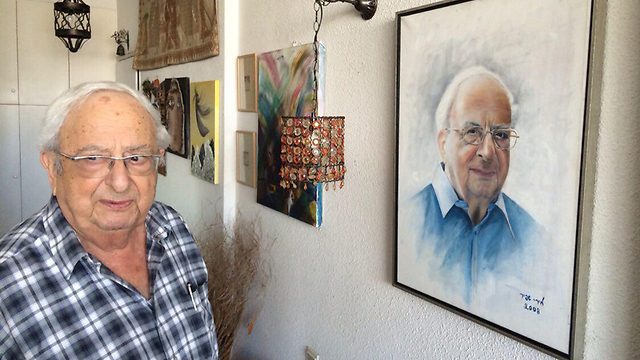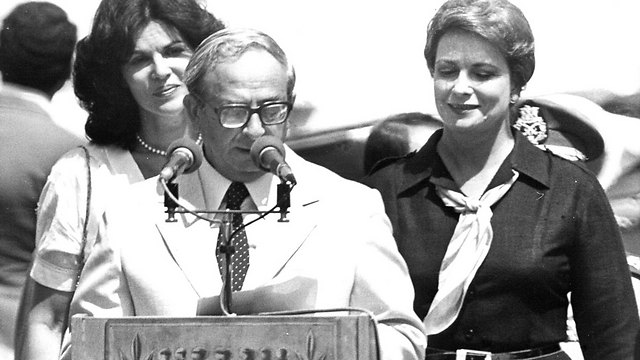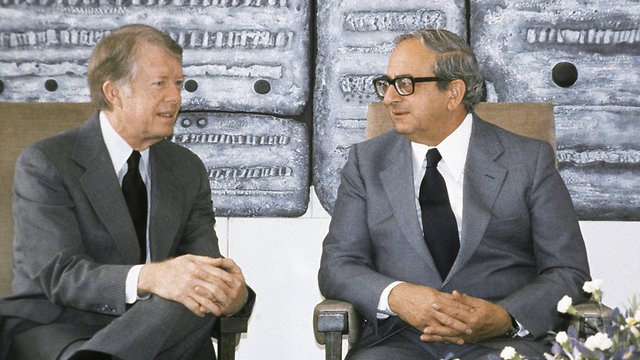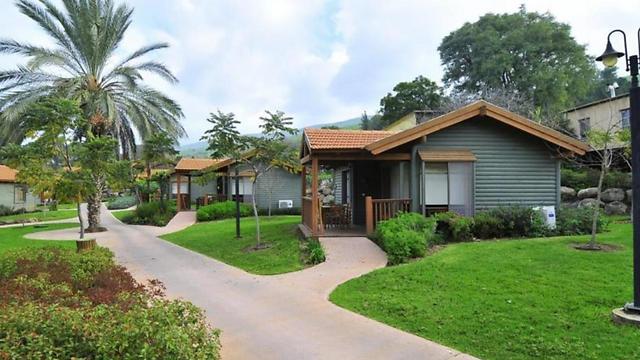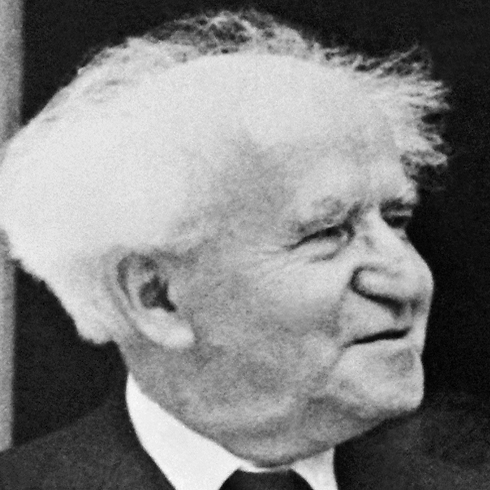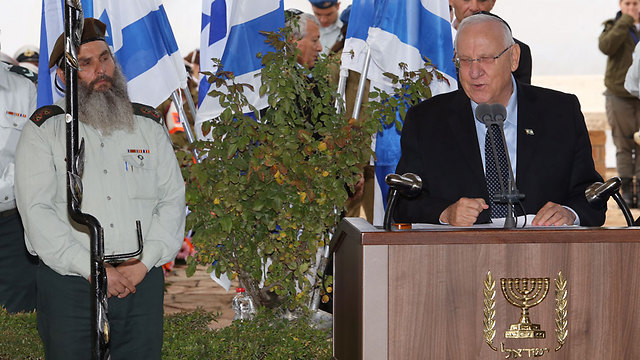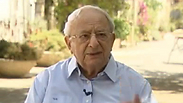
Yitzhak Navon smiled sheepishly many times throughout this interview. "You're a rock, you are a Kotel," the interviewer told him. "No, there is only one Kotel," Navon answered. "We don't have rocks, we have notes."
Several minutes earlier, Israel's fifth president entered the study in his Jerusalem home, wearing a purple buttoned-up shirt, and sat down in front of a library laden with books and a bronze statue of his teacher and mentor, David Ben-Gurion.
It happened six years ago, when Navon was 88 years old. Willook, a company that preserves hundreds of thousands of digital wills both in Israel and abroad, approached him about delivering a public will that would be filmed and released after his passing. Navon agreed, and only a week after that first phone call, he was sitting in front of the camera. He only had one demand – to pass on a message to teens in Israel and elsewhere. Messages to his family were not included in the filmed will. It turns out that his widow Miri and his children Naama and Erez did not know about the recording, and were surprised to read about it on Yedioth Ahronoth this week.
He was interviewed by psychologist Michal Porat, and these are the main things that were said.
Witnessing Israel's redemption
The first question Navon was asked was: "If you could've chosen when and where to be born, what would you choose?"
"The angel Gabriel, according to tradition, is responsible for the ferrying of souls in the land of Israel. He brings and takes souls," Navon said. "If the angel Gabriel came to me and said, 'Look, I'm willing to take your soul now and give it back to you at any period of time in the history of the nation of Israel, from the very beginning to this very day' - I think I would not think of any other time except for when Moses brought down the Ten Commandments from Mount Sinai. That's where I'd want to be, even though, according to tradition, we were all there. But other than that, there is no more important period in the history of Israel, more interesting, and also tragic, like the redemption after two thousand years in exile. To be born at such a historical point in time - I'm glad that is what happened, and I could say, in this massive thing that's called the State of Israel, that I too contributed a brick to this important wall."
Later, Navon spoke about the year he was born - 1921. "It happened when in the land of Israel there were maybe 60,000-70,000 Jews, that's all. Today there are 5.5 million. I once asked Ben-Gurion, 'what do you think? How many Jews are going to be here?' He said he was praying to see half a million Jews in the land of Israel. And he got to see two million, so it was more than he dreamed of."
Speaking about his childhood, Navon said: "I grew up in Jerusalem and went to school here. I studied at the Hebrew University - mostly Islam and Arabic: Arab literature, Arab poetry and culture, because I felt like we are living in this region, in the Middle East, and we are not alone: There are nations here whose culture is Arab. My father would say that there were Turks here who left after 400 years, the English will also leave, and in the end it would be only us and the Arabs who stay, so we have to learn, to get to know, to actually know them.
"I remember we had an Arab neighbor, a friend of our family. My father would visit him often. I was a boy, and my father would take me with him. We'd sit and talk politics. At sunset, the Arab would get up, take a small rug, put it on the floor, kneel down and pray. My father would get his Siddur (Jewish prayer book) out, give it to me, and we'd call out to the same God, but in different corners of the room. So I have a lot of appreciation to Arab literature, to Arab and Muslim culture."
Navon then spoke about one of the most important events during his tenure as president - the peace agreement with Egypt, which was signed ten months after he was made president, and which earned him and invitation to Cairo.
"When we're in a conflict, especially one like that, it's not simple," he said. "We had different wars, and I got to receive an invitation from Sadat for a five-day visit while I was president. I was invited for an official visit to Egypt that was one of the biggest experiences in my life. It's unbelievable: You come to that country, and it's a president of a country that fought against yours, and there we were walking together alongside Israeli and Egyptian flags."
Navon said his fluency in Arabic and his knowledge of Muslim culture played an important role in the warm ties that had developed between him and the Egyptian president. "Fortunately, I could speak Arabic, and Sadat was very interested in feeling that Israel was not this foreign element, as it was made to seem in propaganda. That it wasn't a byproduct of colonialism and imperialism. 'They're not foreign. Look, their president talks exactly like us.' Every day I'd see the impact of my speech on TV, in the Arab press. How the audience embraced and welcomed me."
On Sadat, Navon repeatedly said that "there is no one like him." His successor, Hosni Mubarak, Navon described as "a very realistic man" and added that "it's lucky for Egypt and Israel that this was the president that came after the tragedy of Sadat's murder, because he followed in Sadat's footsteps."
It's also up to us
Later in the interview, Navon spoke about the State of Israel's formative years and its first prime minister and defense minister, David Ben-Gurion. Navon served as Ben-Gurion's personal secretary.
"The State of Israel is a state that was formed before the people were even in it," he explained. "You have to understand: In India, in Burma, in Pakistan - all of the people were already there. Their problem was for the English to leave so they could be independent. Here, that wasn't the case: Here, the English leave, but the people are not yet here. You had to bring them here. No other country had to deal with something like that. And when Israel declared its independence, it was attacked by five armies: Syria, Lebanon, Iraq, Jordan and Egypt.
"The captain was a man like David Ben-Gurion that history and fate put him there at this historic point in time, and he knew how to steer this ship to shore: Both forming the state, leading it during wartime, and setting a vision for the country, what do we have left to do, and what does the state seek to do. All of these put together seem unreasonable, And those who got to be a part of it, won. The Arabs attacked, but if the Arabs had accepted the UN resolution, then there would have been a Palestinian state already, and there would have been peace, and we would have cooperated.
"There are no two peoples who are closer as far as - I don't like this word, but - race. There is no other language as similar to Hebrew like Arabic. Just like two twin sisters. So in that regard, we could have had a different fate, but they preferred fighting, attacking and trying to destroy us. They failed. And now they are divided: Some among them are moderate, some willing to recognize Israel on certain conditions, and some not at all."
When asked if he thought there would ever be peace, he said: "If the more moderate ones increase in number, then there is a chance of having some sort of an accord. And I think that would lead to peace with all Arab countries. Of course this depends a lot on how different they are willing to be, how willing they are for such a possibility. But it's also up to us: How much extremism there is, and how much we understand than in order to make peace, each side must compromise on difficult things as well. Because peace is more important than all of these things.
"I think it is crucial, so I think that over time, the awareness of this need to be flexible, to come closer together. How long that would take - I don't know. Maybe that day won't come. I'm one of those who thing it will come. No one believed there would be peace with Egypt or Jordan either, but we achieved peace when we had the interest to do so. So need to look for this interest, for it to exist. We should and ought to make peace. It would benefit both us and them."
With regards to Israeli Arabs, he said, "Everything that is happening with Israel's Arab citizens is a result of the conflict we have with the Palestinians. There are two types of problems. One problem: Electricity, roads, sewage. Another problem, is education, and it has nothing to do with the conflict. We have to thoroughly treat the problem, but there is also an emotional aspect as a result of the conflict with the Palestinians, and that part will be fixed when we reach peace with the Palestinians. It will solve the emotional problem that Arabs who live in Israel experience. It's the key to peace between with Arab nations which haven't made peace with us as well. It's the main key."
What I learned from Ben-Gurion
Ben-Gurion's name was mentioned once again when Navon told of the fact that many people ask him what he learned from Israel's first Prime Minister.
"They always ask me, what was his way, what would you take from it, how would you summarize his worldview," said the former President, "and I would quote what he said: We can never compete with our rivals, who are now enemies, not in wealth, assets, oil, or minerals, but only in quality, and moral, scientific, and technological superiority. And the condition for Israel's existence is dependant on quality, on the face of the society we represent. They'll also always have more tanks and planes and people, but scientific-technological superiority will aid is in out hour of need."
"There's something about this country," he continued. "For instance, the kibbutz movement: The Israeli people's most beautiful creation – not the biggest, but the most beautiful, in its values. It's the realization of the greatest utopists' dream – an equal society – and it's a shame that it's going through a tough crisis. People would come from all around the world to witness this wonder, to see how these Jews established a society based on justice, equality and sharing."
"It's also a country that accepts refugees, Ethiopians and non-Ethiopians, holocaust survivors. It's a sacrifice, to take in and support refugees. In that way, us being an exemplary country, I call it the aim of creation' or 'a light unto the nations'."
When Navon was asked to speak of the current Israeli leadership, he avoided mentioning any names, only saying that "These days there's no pushing force, so it's important that there be a pulling force. If there are sometimes negative phenomena that involve public figures, leaders or something of that sort – then you are ashamed. The condition for our existence is quality. A high degree of morality, of behavior, of justice, of integrity and creation, and there's a lot of potential here. And it's important that those responsible for the leadership will be people who can set an example."
And what was his great disappointment? Navon gives a surprising answer, "It's the fact that I became the education and culture minister. It was, really, the second choice, because the first was to be foreign minister. It was discussed with Shimon Peres. We were on the list – Peres, me, and Rabin, in that order – and then it was decided that I'd be foreign minister, and I hoped that if I was in the role of foreign minister I could work on negotiations with the Arabs, with the Arab countries. I hoped that I could contribute in that field, it was very important to me, but for coalition (political coalition forming -ed) reasons it didn't work."
"Ezer Weizman became foreign minister, so the opposition was another ministry, so of all the other things, Education and Culture was closest to my heart because I was once a teacher and dealt in culture a bit. In that way, chronologically, that's what happened, but of course I put my own goals up in the context of Education and Culture: A. Educating for values. B. Developing the scientific-technological education. And the third thing, educating towards democracy and coexistence, coexistence between poles, religious and non-religious, Jews and Arabs, north and south, rich-poor, bringing together and living with each other."
Here he displayed the world of values that he tried to instill in the children of Israel. "The first thing, I held up educating towards values. So they asked, which values? There are many values. Someone mentioned 90 values, 120 values, what top ten is accepted by everyone. Truth, integrity, organization, loyalty to the state, loving your country, respecting others, those different from you. It's not that difficult, educating towards values. You need to teach, and that's it. In large part it depends on our leaders' example and to what degree they need to be aware of the subject. You can't educate by preaching. You can educate by personal example."
Giving to others, giving to the country
During some parts of the interview, Michal Porat seemed embarrassed with the situation, but her interviewee didn't show any signs of discomfort: Navon spoke articulately and with ease, regardless of the circumstances in which his word's would be pulished. It seemed sometimes that we was enjoying the opportunity given to him to sum up is life, to reminisce about bygone days and gather conclusions.
Eran Alfonta, CEO of Willook, says that he was surprised with the former President's openness to the idea and stage. "We didn't expect a person like Navon, who was among the country's founders, would go for an idea that was considered kooky at the time," he says. "He was very glad to leave a message for the next generations." Navon's will is stored at SafeBeyond – a digital vault system that allows people to store messages for their loved ones. And it can be viewed on the company's website as of today.
"The fact that you're teenagers," said Navon to his younger viewers, "is a passing thing. You will also grow, and the years will pass, but there are things that you should look at now. First of all, of course there's a need for self actualization, but you always need to remember that there's a country and a people, and you need to contribute and give. Giving to others, giving to the country, and at the end of the day it turns out that the greatest gift you get is when you give, when you contribute."
"So of course, studying is important, and traveling, and enlisting in the military, and youth movements according to your perspective, being involved in public matters, in political parties, in state matters, being active, not just dealing with my internet, my website of my ambition to succeed and make money. There's nothing wrong with it, but not just."
"We need to remember that we're only representatives, a part of a people who are still overseas, and whom we wish to come here. We want to establish here a society which you will be proud of, which we will be proud of, that will attrach idealistic Jews to come live with us, that will prevent people from leaving, that the world will support us if we are worthy of it, that we'll leave with the feeling that we are different, preserving the society's quality. As Ben-Gurion always reminded, our strength is in our quality. Two things will aid us: Our righteousness and our strength. Our destiny has always been in quality, superior quality, science, technology, and morality."
"Maybe these are overly high-minded words, but I assume intelligent youths understand what's being said to them. It's also not easy because it requires an investment of time and thought, but I hope you do it and wish you success in this path, and in your lives."
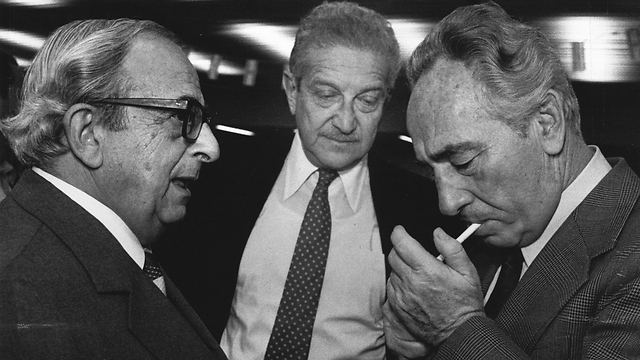
Afterwards, Navon was asked what his greatest fear was regarding the future. His answer was, "The shrinking of the Jewish people. Usually, after a war there's a rise in population: More births. In the holocaust, in which we lost six million Jews who were brutally murdered, there was a reaction afterwards. The Jewish people responds: Hitler wanted to kill six million Jews – we will create six million, 12 million, 20 million. But it didn't happen. I don't know why, I can't explain, but it's a fact.
"There's a shrinking of the Jewish people, for several reasons. One of them is a very low birthrate, about 1.5, as far as I know, children per family. Many marry late, and after they marry bring just one or two kids into the world. Second, there's a higher and higher rate of assimilation. Let's not kill ourselves. Assimilation and mixed marriages, in both cases, are a loss to the Jewish people."
Navon also has criticism of the education that Jewish children receive in Israel and abroad, and he preferred to say it in English.
Jewish children don't get Jewish edication, he said. We are called people of the book, but many of us have never read that book. Einstein once said, what a shame that I was born Jewish, otherwise I would have chosen to be jewish. If Einstein said that, it has to mean something. We need to read, to know the bible, to know our origins, identify with our long history and make sure the children get a Jewish education, and I'll even say a Zionist one.
If we create a country of high quality, Navon said, and if there's good Jewish education, there has to also be, as a byproduct, immigration to Israel, a growing number of youths and others who come to live in Israel and be a part of creating this nation."















